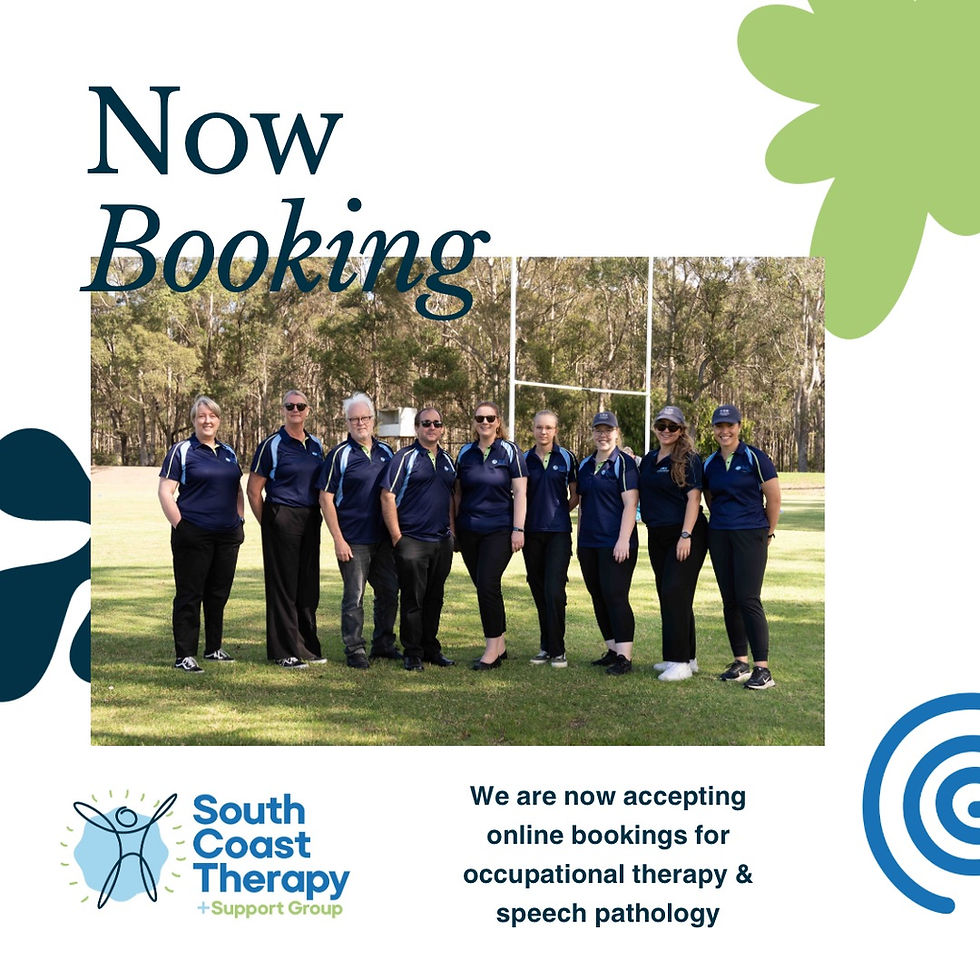What Do Occupational Therapists Assess? Exploring Self-Care, Productivity & Leisure
- claire2876
- Jul 23
- 3 min read

Occupational therapists (OTs) play a vital role in helping people of all ages participate in the activities that matter most to them. The word “occupation” doesn’t only mean employment—it refers to all the everyday tasks that occupy our time. These include everything from getting dressed in the morning, attending school or work, to enjoying hobbies and socialising with others.
In this blog, we’ll explore the three core areas occupational therapists assess: self-care, productivity, and leisure. We’ll also provide practical tips and explain how accessing OT services in Shoalhaven or Shellharbour can help you or your loved ones live life more fully.
1. Self-Care: Building Independence in Daily Life
Self-care refers to all the personal tasks we do every day to maintain health and wellbeing. This includes activities like:
Showering and grooming
Dressing and undressing
Eating and drinking
Toileting and hygiene
Sleep and rest
Medication management
How OTs Assess Self-Care
OTs observe how you complete self-care tasks to identify physical, sensory, or cognitive barriers. For example, an OT might notice that a person has difficulty with buttons or shoelaces due to limited hand strength or coordination. Or, they may find that a person forgets steps in a task due to cognitive challenges such as brain injury or dementia.
They also consider the environment—does the bathroom need grab rails? Is the layout of the home affecting independence?
Practical OT Tips for Self-Care:
Use adaptive equipment: Long-handled sponges, shower chairs, and elastic shoelaces can improve independence.
Create a routine: Visual checklists or picture schedules help people with memory or executive function difficulties.
Energy conservation: Sit down while completing grooming tasks or break up your routine across the day.
2. Productivity: Supporting School, Work, and Home Life
Productivity includes tasks that contribute to a sense of purpose and accomplishment. For children, this is often schoolwork; for adults, it may be employment, volunteering, or managing the home.
OTs help clients develop the physical, cognitive, and emotional skills necessary to thrive in these settings. This might involve helping a child with attention difficulties stay on task in the classroom, or supporting an adult recovering from an injury to return to work.
Common Productivity Areas OTs Assess:
Attention, memory, and organisation
Fine motor and handwriting skills
Workplace ergonomics
Fatigue management
Task planning and execution
Use of assistive technology
Tips for Improving Productivity:
Use timers and alarms to keep on track during tasks.
Break tasks into smaller steps to avoid overwhelm.
Incorporate movement breaks throughout the day to stay regulated and alert.
3. Leisure: Enhancing Quality of Life and Wellbeing
Leisure is more than just free time—it’s essential for mental health, identity, and connection with others. Leisure can look different for everyone: playing sport, gardening, listening to music, or painting.
People with disabilities, injuries, or mental health challenges may struggle to access or enjoy leisure activities. OTs work with individuals to identify their interests and build the skills or access needed to re-engage with these meaningful occupations.
OT Strategies for Leisure Participation:
Sensory integration strategies for clients with sensory sensitivities
Goal-setting and graded exposure to help re-engage in social activities
Supporting physical access to community-based leisure options
Tips for Making Time for Leisure:
Schedule it in—treat leisure as a non-negotiable part of your day.
Start small—even 10 minutes of a hobby can have a positive effect.
Adapt activities to meet your needs with the help of an OT.
How an OT Can Help You or Your Loved Ones
Whether you’re supporting a child who struggles with school tasks, an adult recovering from injury, or an elderly loved one wanting to stay independent at home, occupational therapy can make a difference. At South Coast Therapy & Support Group, our OTs in Shoalhaven and Shellharbour work with clients to assess their needs across all aspects of daily life and create individualised therapy plans.

Book an Appointment
We’re here to support your goals—big or small.









